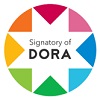Análisis fotográfico de sonrisa en adultos jóvenes de diferentes regiones del Ecuador
Resumen
El objetivo de esta investigación fue determinar diferencias en las características de la sonrisa en adultos jóvenes de distintas regiones del Ecuador. Para ello, se tomaron fotografías frontales de 93 participantes, distribuidos equitativamente entre las tres regiones (costa, sierra y oriente), y se analizó las variables cuantitativas de la sonrisa utilizando el programa AutoCAD. Los resultados revelaron diferencias estadísticamente significativas (p < 0.05) entre las regiones en relación con el ancho del corredor bucal y la coincidencia de la línea media. Asimismo, al considerar al sexo como variable, se evidenció una diferencia significativa únicamente en la exposición gingival, siendo mayor en las mujeres. Estos hallazgos sugieren que la procedencia geográfica puede influir en las características de la sonrisa, información que resulta particularmente relevante y puede ser aplicada en las diversas áreas de la odontología, especialmente en ortodoncia, donde estas características pueden modificarse y mejorarse mediante el tratamiento
Descargas
Citas
Awad, M. A., Alghamdi, D. S., y Alghamdi, A. T. (2020). Visible portion of anterior teeth at rest and analysis of different smile characteristics in the Saudi population of the Jeddah region. International Journal of Dentistry, 2020. https://doi.org/10.1155/2020/8859376
Charavet, C., Bernard, J. C., Gaillard, C., & Le Gall, M. (2019). Benefits of Digital Smile Design (DSD) in the conception of a complex orthodontic treatment plan: A case report-proof of concept. International Orthodontics, 17(3), 573-579. https://doi.org/10.1016/j.ortho.2019.06.019
Chen, Y.-H., Cheng, Y.-L., Cheng, H., & Yu, H. (2019). Comparison of smile esthetics among celebrities, dentists, and dental students in a Han Chinese population. The Journal of Prosthetic Dentistry, 123(6), 845-849. https://doi.org/10.1016/j.prosdent.2019.08.014
Cheng, H. C., & Wang, Y. C. (2018). Effect of nonextraction and extraction orthodontic treatments on smile esthetics for different malocclusions. American Journal of Orthodontics and Dentofacial Orthopedics, 153(1), 81-86. https://doi.org/10.1016/j.ajodo.2017.05.033
Christou, T., Betlej, A., Aswad, N., Ogdon, D., & Kau, C. H. (2019). Clinical effectiveness of orthodontic treatment on smile esthetics: A systematic review. Clinical, Cosmetic and Investigational Dentistry, 11, 89-101. https://doi.org/10.2147/CCIDE.S189708
Ferreira, J. B., da Silva, L. E., Caetano, M. T. de O., da Motta, A. F. J., Cury-Saramago, A. de A., y Mucha, J. N. (2016). Perception of midline deviations in smile esthetics by laypersons. Dental Press Journal of Orthodontics, 21(6), 51-57. https://doi.org/10.1590/2177-6709.21.6.051-057.oar
Goldstein, R. E. (1969). Study of need for esthetics in dentistry. The Journal of Prosthetic Dentistry, 21, 589-598. https://doi.org/10.1016/0022-3913(69)90005-5
Horn, S., Matuszewska, N., Gkantidis, N., Verna, C., & Kanavakis, G. (2021). Smile dimensions affect self-perceived smile attractiveness. Scientific Reports, 11(1). https://doi.org/10.1038/s41598-021-82478-9
Janson, G., Branco, N. C., Fernandes, T. M. F., Sathler, R., Garib, D., & Lauris, J. R. P. (2011). Influence of orthodontic treatment, midline position, buccal corridor and smile arc on smile attractiveness. Angle Orthodontist, 81(1), 155-163. https://doi.org/10.2319/040710-195.1
Jiménez-Castellanos, E., Orozco-Varo, A., Arroyo-Cruz, G., e Iglesias-Linares, A. (2016). Prevalence of alterations in the characteristics of smile symmetry in an adult population from southern Europe. Journal of Prosthetic Dentistry, 115(6), 736-740. https://doi.org/10.1016/j.prosdent.2015.08.031
Kadhim, H. A., Ghazi, A., Al Toma, R. R., & Saloom, H. F. (2020). Impact of assessing smile parameters as part of orthodontic treatment planning: A survey-based analysis. Journal of the World Federation of Orthodontists, 9(3), 117-122. https://doi.org/10.1016/j.ejwf.2020.06.002
Khan, M., Kazmi, S. M. R., Khan, F. R., & Samejo, I. (2020). Analysis of different characteristics of smile. BDJ Open, 6(1). https://doi.org/10.1038/s41405-020-0032-x
Nagar, S. D., Conley, A. B., Chande, A. T., Rishishwar, L., Sharma, S., Mariño-Ramírez, L., Aguinaga-Romero, G., González-Andrade, F., & Jordan, I. K. (2021). Genetic ancestry and ethnic identity in Ecuador. Human Genetics and Genomics Advances, 2(4). https://doi.org/10.1016/j.xhgg.2021.100050
Parrini, S., Rossini, G., Castroflorio, T., Fortini, A., Deregibus, A., & Debernardi, C. (2016). Laypeople’s perceptions of frontal smile esthetics: A systematic review. American Journal of Orthodontics and Dentofacial Orthopedics, 150(5), 740-750. https://doi.org/10.1016/j.ajodo.2016.06.022
Rao, A., Badavannavar, A., & Acharya, A. (2021). An orthodontic analysis of the smile dynamics with videography. Journal of Oral Biology and Craniofacial Research, 11(2), 174-179. https://doi.org/10.1016/j.jobcr.2021.01.001
Saini, R., Thakur, N., Jindal Goyal, R., Sharma Rai, K., Bagde, H., & Dhopte, A. (2022). Analysis of smile aesthetic changes with fixed orthodontic treatment. Cureus, 14(12), e32612. https://doi.org/10.7759/cureus.32612
Seixas, M. R., & Câmara, C. A. (2021). The smile arc: Review and synthesis. Dental Press Journal of Orthodontics, 26(3). https://doi.org/10.1590/2177-6709.26.3.e21spe3
Siddiqui, N., Tandon, P., Singh, A., & Haryani, J. (2016). Dynamic smile evaluation in different skeletal patterns. Angle Orthodontist, 86(6), 1019-1025. https://doi.org/10.2319/012616-69.1
Sriphadungporn, C., & Chamnannidiadha, N. (2017). Perception of smile esthetics by laypeople of different ages. Progress in Orthodontics, 18(1). https://doi.org/10.1186/s40510-017-0162-4
Wang, S., Lin, H., Yang, Y., Zhao, X., Mei, L., Zheng, W., Li, Y., & Zhao, Z. (2018). Use of autonomous maximal smile to evaluate dental and gingival exposure. Korean Journal of Orthodontics, 48(3), 182-188. https://doi.org/10.4041/kjod.2018.48.3.182
Derechos de autor 2025 Nathaly Durán-Cañizares, Miriam Verónica Lima-Illescas, Juan Andrés Solano-Espinoza

Esta obra está bajo licencia internacional Creative Commons Reconocimiento-NoComercial-CompartirIgual 4.0.
CC BY-NC-SA : Esta licencia permite a los reutilizadores distribuir, remezclar, adaptar y construir sobre el material en cualquier medio o formato solo con fines no comerciales, y solo siempre y cuando se dé la atribución al creador. Si remezcla, adapta o construye sobre el material, debe licenciar el material modificado bajo términos idénticos.
OAI-PMH URL: https://cienciamatriarevista.org.ve/index.php/cm/oai














